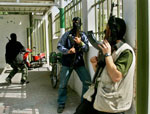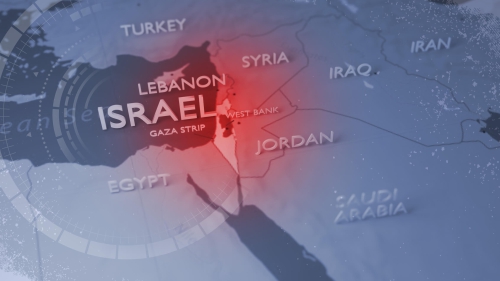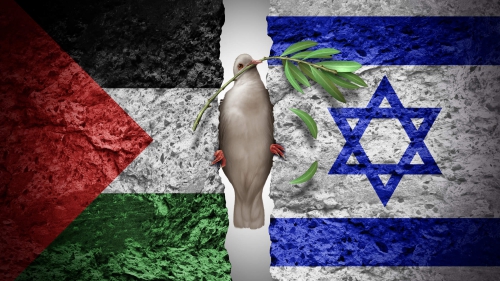Demoralization and Absence
 |
A once profound and widely read commentator recently claimed he no longer writes about the Palestine/Israel conflict because "Palestinians are killing each other". Feeling his words have ceased to carry weight he simply decided not "to take sides".
What should be made of such a reaction? Granted, what has transpired in Palestine in recent years is disheartening, demoralising and confusing.
It is disheartening because a long-victimised nation, subject to an intense and ongoing colonial project should deploy all its energies in fighting its enemy's long-term goal of an ethnically cleansed Palestine, i.e. a Palestine without Palestinians. Infighting is hardly an appropriate response to colonialism.
It is demoralising because the Palestinians should inspire a global movement aimed at sending a clear message to Israel, that racism, colonialism and apartheid no longer have a place in a world that seeks equality, peace and harmony. Unfortunately a divided nation cannot present a unifying leadership, let alone a unified message.
And what is happening in Palestine is very confusing to many of those who have long sided with the Palestinian struggle for freedom. It is a struggle that has been manipulated to suit the aims of different groups, each spurred on by ideological, religious and other motives. In some places the fight in Palestine is conducted on behalf of Islam, in others it is to resist racism. For some, the Palestinian struggle is an aspect of the class war, and I once read, somewhere, the battle between Israel and the Palestinians described as a civil war.
Thus is the conflict between a nation denied its land and basic freedoms and a state with immense wealth and power distorted, allowing the latter to defy international law on a daily basis, thanks in part to the backing of the world's only superpower, the United States. De-contextualised, the struggle has become the vehicle for spurious meanings that lead to the misunderstanding of what is in fact transpiring. In some instances it has led to an over-romanticising of the conflict, which goes part way to explaining the bewildered response of many who long stood in solidarity with the Palestinian people.
But the Hamas takeover of Gaza in June 2006, and the factionalism and bloodshed associated with it should not have come as a surprise. The conflict in Palestine, like any other conflict, is rational, and can serve as a classic example of a regional conflict with international boundaries, allowing opportunity for analysis that does in fact matter to Americans (the role of their country in the conflict, and the power of the Israeli lobby in their midst), the Europeans (who wish to see a truly independent Europe playing a less injurious role in a region where they have a vested interest in stability), the United Nations (whose credibility has been damaged too often by the belligerent US-Israeli alliance), and others.
Many questions must be asked and debated. Should solidarity with the people of Palestine wane because the Palestinians chose a religious group to represent them in democratic elections, hurting the secular sensibilities of many of their supporters? Can the Palestinians be held collectively responsible for the few among them who choose to align their interests with those of power and capital? Is what Mahmoud Abbas did -- working with the coloniser to isolate a large segment of his people -- unprecedented? Has any nation that fought for its freedom actually managed to avoid the peril of infighting?
One can understand the sense of demoralisation that has struck many supporters of the Palestinian cause as events unfolded in the Gaza Strip and the West Bank. However, it is also important to warn that if such demoralisation is caused by the Palestinians failing to live up to the ideological and religious expectations of others, then it is perhaps time for those others to engage in some serious introspection as to why they wished to support the Palestinian struggle in the first place.
I believe that there is no choice but to side with that which is just and morally upright even at the risk of creating ideological inconsistencies or, dare I say, upsetting religious dogma. The conflict in Palestine doesn't have to be a straightforward clash between haves and have-nots, blacks and whites, Muslims and Jews.
The responsibility of deciphering recent accretions to the seemingly mystifying conflict is the responsibility of the intellectual who is capable of research, analysis and articulation. The intellectual is not a cheerleader, nor a poet, and should, no matter where his sympathies lie, remain capable of dispassionately approaching the subject at hand.
Over 30 years ago, Noam Chomsky wrote in the New York Review of Books: "Intellectuals are in a position to expose the lies of governments, to analyze actions according to their causes and motives and often hidden intentions. In the Western world, at least, they have the power that comes from political liberty, from access to information and freedom of expression."
No one can claim that the Palestinian question is easy to understand. It may be a classic colonial case that should not have been allowed to fester for so long but to grasp an event as recent as Palestinian infighting requires an examination of various layers of analyses, local, regional and international. One must ask questions about causes, motives and hidden intentions. If done properly, this will show that as disheartening, demoralising and confusing as they may seem from the outside, recent developments in Palestine were predictable and are consistent with the history of past national struggles. If we do not wish to shirk our moral and intellectual responsibilities we must resist the temptation to make of Palestine an exception.
-Ramzy Baroud (www.ramzybaroud.net) is an author and editor of PalestineChronicle.com. His work has been published in many newspapers and journals worldwide. His latest book is The Second Palestinian Intifada: A Chronicle of a People's Struggle (Pluto Press, London).
Related Suggestions
I have not condemned Hamas or disrespected any one in particular for your clarification. I only used information received from the media about the character of Hamas as organization determined to destroy an elect Nation on earth "Israel". No amount of righteousness or religiousness should cover from the penance of this serious vow but repentance in this lifetime.
About the gay marriage you mentioned, it is not a religious matter. The secular rules approve unnatural personal passions in the guise of democracy (sometimes = demon crazy). This whole thing is not happening within the frame of Christianity and those not remaining in their Christian precinct are already condemned by their own actions even if they continue professing faith (on what ground?). We should only shun ourselves from such actions instead of braving to stone them to death. They will die naturally and go to hell to burn there for ever.
A real identity test that separates professing Christians and true born again Christian (=Yishai, the term used in our culture) is made by integration of the practical conducts of faith, walk, work, speech and the like. Can we wear elephant head on the human body or vice versa?
Shalom.
I echoed the views of Brother Babandi A. Gumel, he's talking about the Muslim ummah. What is so wrong about his views ? Who are you to tell Muslims on the kind of unity that they should have ?
The will of the Palestinians people should be respected, I may have a little reservations on Hamas but they won so why all these fuss ? The U.S. has chosed not to respect this victory for their own selfish interest. But then where is this respect for the democracy and freedom of choice ? In the same manner, while preaching democracy abroad, there was a transgression of democratic process in the U.S. George Bush first victory in the 2000 U.S. presidential election was not at all democratic, so why are you now doing the bidding for the U.S. in telling Muslims what they can or cannot accept.
In the same manner, may I ask you, what have you got to say about some states in U.S that legalise gay marriage ? Does that not goes against your Christian belief ? And more European countries, the Christians are legalising it, as willed by the majority of the people ? Now using your test of condemning Hamas, then shouldn't you be condemning those Christendom as well. You have no right to condemn Hamas, it shows your utter disrespect for the democratic process.
I advise you to put your chapel in order first.
do you not consider that the unity of Ummah will be again like the unity of Palestinian People who voted Hamas to Power? Unity against the conviction of the conscience simply drags! The expressions in diversity are genuine and some can be saved in their confusion while others are destroyed in false confidence.
The Palestinian people collectively voted the classified Terrorist Organization "Hamas" to power with overwhelming majority. With this they have weakened their moral status as a people who are unfriendly to their country. Are they not having the burnt of it now?





























